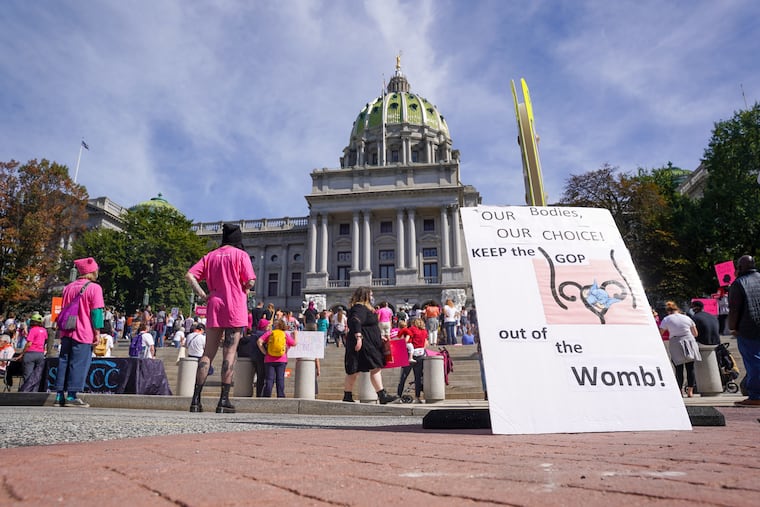States should set their own abortion laws. This is how a republic works.
Now, the fight over abortion will go on, but it will be a democratic exercise in which fellow citizens in each state set policy for themselves.

There is a tendency on the right to view the U.S. Constitution as perfect. True, it is an exceptional work, one that has endured the test of centuries. But it is the work of mortals, not an object of worship. Those who wrote it knew that, which is why they made it subject to amendment.
Across the political spectrum, there’s another misconception about the Constitution that is even more harmful: the idea that the Constitution protects every right and privilege we hold dear. It is a dangerous mistake, as we have seen in recent days, most especially in the case of Dobbs v. Jackson Women’s Health, whose recent ruling by the Supreme Court overturned decades of legal precedent about abortion.
As originally written, the Constitution protected very few individual rights; it was mostly a scheme of governance and a division of powers between the federal and state governments. Such individual rights as it later came to protect were added by explicit amendments, starting with the Bill of Rights. Over the years, judges have managed to find rights in that text that aren’t always explicit, coming both from the right (as in Lochner v. New York, which held that a law setting maximum working hours violated a vague “right to contract”) or the left (as in Roe v. Wade, which legalized abortion based on an equally vague “right to privacy”).
» READ MORE: How a proposed change to the Pa. constitution could reshape the the future of abortion
Abortion — and whether a right to it exists and is protected by the Constitution — has been a topic to inspire passion and anxiety on both sides for decades. Roe v. Wade was an attempt by the Supreme Court to suppress that debate, to give America one answer and let us move on to other issues. The result was the opposite, inflaming tensions even further and inspiring a fifty-year legal and political movement to undo the court’s constitutional innovation.
Conservatives opposed the Roe verdict from the start, but even some prominent legal scholars on the left who support the right to abortion, including Akhil Reed Amar, have long acknowledged that there is no justification for pretending the Constitution protects that right. Others, including Lawrence Tribe and Ruth Bader Ginsburg, expressed doubts about the court’s reasoning in the past but came to support Roe as a practical matter — accepting the policy they favored despite the strained logic the court used to impose it on the country.
Overruling Roe will not end that debate any more than imposing Roe did — the protests around our region and our nation last weekend made that clear. But Dobbs was not intended to settle anything, nor to impose one vision of abortion rights on the entire country. It was intended to return the debates back to the people — more specifically, the people living in each individual state — where it had been (along with debate over most other laws) until 1973.
Having these laws decided by democratically elected legislatures is more in line with how the rest of the world has made abortion laws. This is true in Europe, where various nations’ parliaments have decided where to draw the line, and in Australia, where each state legislature has decided the law for its people. These laws, whether you agree with them or not, are the result of democracy in action.
Now, the fight over abortion will go on but, as in those places, it will be a democratic exercise in persuading our fellow citizens, which is how a republic is supposed to work.
National polls show that most U.S. residents support Roe v. Wade — but also that a majority believe abortion should be generally illegal after the first trimester (a policy that would not have been permitted under Roe). These levels of support also vary significantly from state to state. Last week’s ruling lets the residents of each state set policy for themselves.
“The question of abortion may soon be brought to the people of our state.”
So far, Pennsylvania’s law is unchanged, but the question of abortion may soon be brought to the people of our state. Legislators in Harrisburg have proposed a state Constitutional amendment that would state there is no right to an abortion in Pa.; if the bill passes, state residents will have a chance to vote on whether they agree. This is democracy at work.
Other states have codified changes in recent years in anticipation of this day. I personally think New York’s very liberal abortion law is wrong-headed, but I can’t deny that it reflects the legitimate judgment of the people of that state, expressed through their legislature. Equally legitimate and democratic are Mississippi’s 15-week ban and Ohio’s six-week limit.
The Constitution is good, as a general matter, but it is not the beginning and end of all goodness and rightness in law. As a republic, we also need to rely on democracy.
Finding the right answers to what the law should be requires thought, discussion, and even compromise — all things that are now possible once more in the debate over abortion.
Kyle Sammin is editor-at-large at Broad + Liberty.